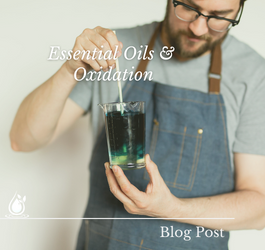What you should know about oxidized essential oils
You are likely here because you have a love for essential oils just like we do! Essential oils are lauded for their therapeutic properties and delightful aromas. However, there can be a hidden danger lurking in those little bottles: oxidation. When essential oils oxidize, they can cause skin irritation or even harm instead of providing the expected healing and soothing effects. Understanding this risk and learning how to identify oxidized oils is crucial for anyone who uses these potent botanical extracts.
What is Oxidation?
Oxidation is a chemical reaction that occurs when oils are exposed to oxygen, light, or heat. This process alters the oil's chemical structure, turning the beneficial compounds into potentially harmful ones. Oxidized oils can lose their therapeutic properties and may even become skin sensitizers, causing reactions such as redness, itching, or dermatitis.
The Risks of Using Oxidized Essential Oils on Skin
Using oxidized oils can lead to various skin issues, including:
-
Skin Sensitization: Repeated exposure to oxidized oils can lead to allergic reactions, even if you've used the oil before without any problems.
-
Irritation and Inflammation: Oxidized oils can irritate the skin, causing redness, swelling, and discomfort.
-
Photoxicity: Certain oxidized oils can become phototoxic, meaning they cause a reaction on the skin when exposed to sunlight, leading to burns or blisters.
How to Spot Oxidized Essential Oils
-
Smell the Difference: Fresh essential oils have a clean, crisp aroma. If the oil smells rancid or has a sharp, metallic scent, it's likely oxidized.
-
Check the Color: Some essential oils may change color as they oxidize. For instance, clear or pale yellow oils may turn a deep yellow or brownish hue.
-
Assess the Texture: Oxidation can also affect an oil's consistency, making it thicker or stickier than when it was fresh.
-
Review the Expiry Date: Essential oils don't last forever. Check the expiry date, and be wary of any oil that's been open for more than a year, especially citrus oils which tend to oxidize faster.
How to Prevent Oxidation
-
Store Properly: Keep your oils in dark glass bottles and store them in a cool, dark place. Refrigeration can also help extend their shelf life.
-
Tight Sealing: Ensure the cap is tightly sealed after each use to minimize exposure to air.
-
Use Quickly: Once opened, use the oil within six months to a year, depending on the type of oil.
-
Dark Containers: UV light can accelerate oxidation, so it’s best to purchase oils in dark-colored bottles.
While essential oils can be wonderful natural remedies, it's essential to respect their potency and understand the risks of using them improperly. By staying alert to the signs of oxidation and storing your oils correctly, you can ensure you're reaping the benefits of these potent extracts without compromising your skin's health. Always remember, when in doubt, it’s better to err on the side of caution and dispose of any oil that seems off. Your skin will thank you for it.








